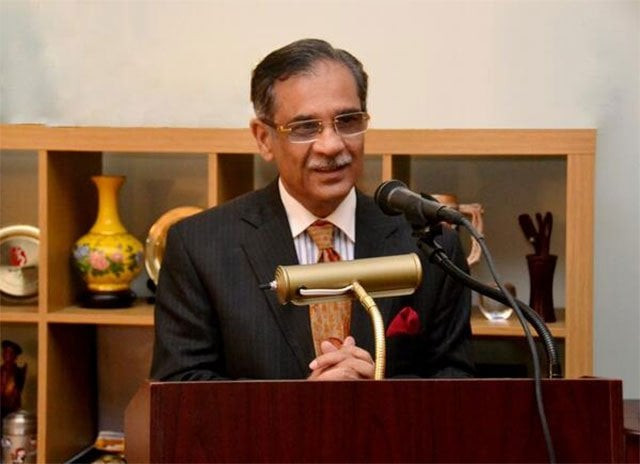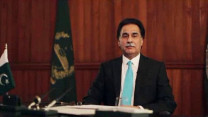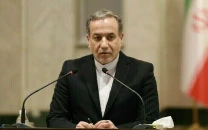Ongoing critique of SC troubling, says CJP
Remarks come during hearing of Tareen, Imran disqualification case

Chief Justice of Pakistan Mian Saqib Nisar. PHOTO: FILE / EXPRESS
While hearing a case pertaining to the disqualification of Pakistan Tehreek-e-Insaf leaders Imran Khan and Jahangir Tareen, the CJP questioned if it was suitable behaviour for those tasked with upholding the law and the Constitution.
The chief justice observed that the criticism would not affect their stature, nor would it compel the judges to be ‘dishonest’ with their work. “What could be a higher position than the one they are holding now? Why would they be unfair in their work?” he asked. The CJP said that their (judges) restraint and patience should be appreciated.
Though the chief justice did not take any names, PTI lawyers believe that Justice Nisar seemed to be referring to comments made by former Prime Minister Nawaz Sharif where he alleged that the judges of the court hate him. “The hatred, anger, and words of the judges will constitute dark history,” Nawaz said after the Supreme Court dismissed his petition for reviewing the verdict on November 7.
The three-judge bench headed by CJP did not entertain the petitioner’s plea to summon the records of Imran Khan’s 1997 nomination papers.
Akram Sheikh, counsel for Pakistan Muslim League Nawaz (PML-N) leader Hanif Abbasi, said Khan has admitted that he contested the 1997 elections, which makes it his responsibility to submit his nomination papers for that year. The bench, however, observed that it is the responsibility of the petitioner to submit undisputed documents for disqualification of any candidate under Article 184 (3) of the constitution.
Judges filled with hatred, says Nawaz Sharif
Meanwhile, Justice Umar Ata Bandial noted that the main question is that how Imran’s offshore company’s euro account surfaced.
The hearing was then adjourned till November 14.
The PML-N legal team is claiming that the ECP’s record shows that Khan concealed details of his assets and liabilities in the annual returns he filed in 2003, 2004, 2005 and 2006. The record shows that Khan did not mention details about the claimed loan taken from his wife Jemima Khan to purchase land in Banigala in the returns submitted for 2003 and 2004. The PML-N lawyers believe that these omissions are enough to disqualify Khan under Article 62. One member also questioned why Khan kept his offshore company alive 12 years after the sale of the London flat.
Earlier, Attorney General for Pakistan Ashtar Ausaf Ali, while giving legal assistance on a matter related to Jahangir Tareen’s disqualification, stated that Tareen has already admitted to contravening the SECP Ordinance of 1969, which led to him being penalised with fines.
“He then attempted to challenge the same law by way of a supplementary application ten years later [in the current case]. The law cannot be challenged [now] in accordance with [legal] principles”, said the AGP.
It is further stated that the transitional provisions of the Securities Act of 2015 had protected the provisions of the 1969 ordinance and actions taken under it. By extension, this validated the finality of the order against Tareen, he said, while noting that Tareen did not challenge the 2015 act.
Asset concealment case: ECP ‘unable to provide’ Imran’s 1997 nomination papers
“Since the fines submitted to the SECP are accrued to the FCF by virtue of the SECP Act 1997, the same law satisfies the test under Article 73 of the Constitution, and is, therefore, a money bill...which may not be assailed in a court of law.”
The hearing of the case was then adjourned till Tuesday. It is expected that the bench will conclude proceedings next week.



















COMMENTS
Comments are moderated and generally will be posted if they are on-topic and not abusive.
For more information, please see our Comments FAQ